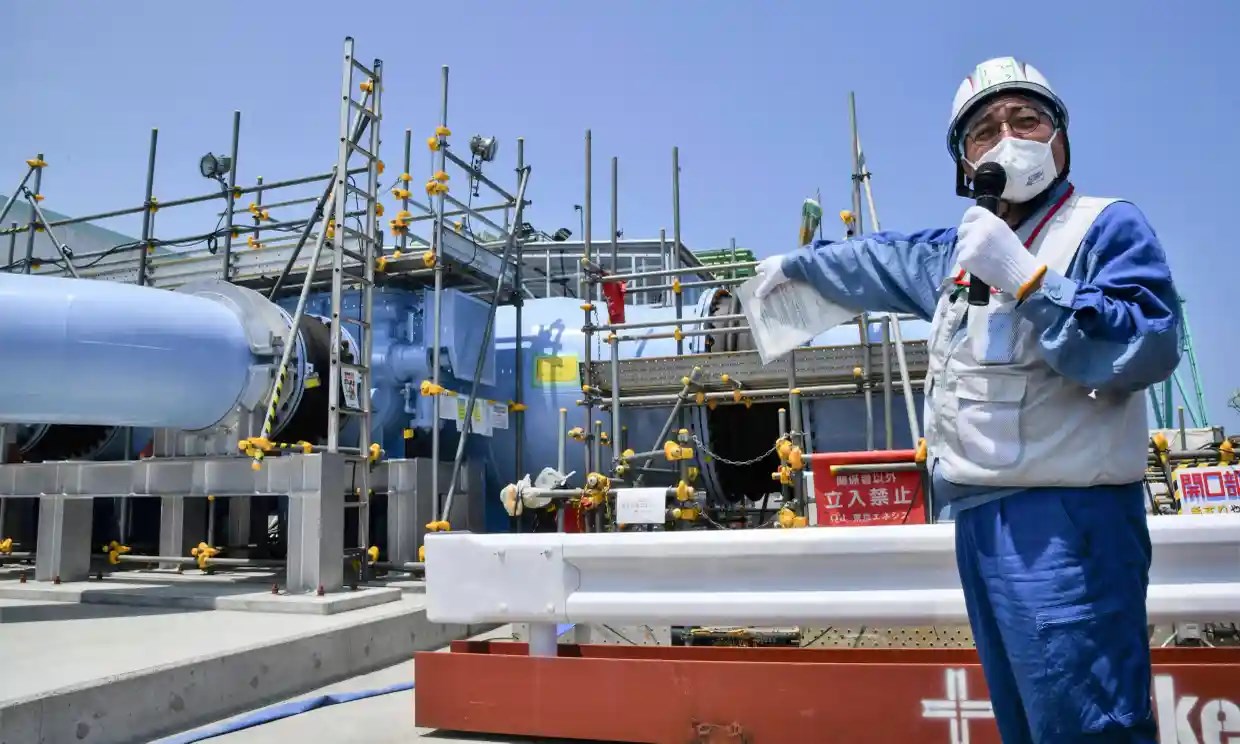China urges suspension of discharging Fukushima's water into Pacific
China expresses concern about releasing wastewater into the sea due to the presence of tritium residues.
-

A Tepco employee at Fukushima Daiichi nuclear power plant (AP)
As the IAEA chief visits Japan to deliver the results of the safety report on the planned release of nuclear-contaminated water, China has urged the suspension of the Japanese scheme.
Beijing criticized the proposal as "extremely irresponsible" when it was unveiled in 2021, and it underlined its objections on Tuesday as IAEA Director Rafael Grossi began a four-day tour where he is expected to present the findings of the organization's safety evaluation.
China demanded that the water flow be halted through its embassy in Japan, stressing that the IAEA's assessment cannot be viewed as a "pass" for it.
"The discharge of radioactive water from the Fukushima-1 NPP will affect the health of people all over the world, global marine environment and international public interests, this issue has caused widespread concern of the global community. China has repeatedly expressed its stance to Japan on the disposal of radioactive water from the Fukushima-1 NPP," Chinese Ambassador to Japan Wu Jianghao said on Tuesday.
According to him, "[Japan] should cease the realization of the discharge plan into the sea, agree to discuss all possible disposal options, allow all concerned parties to conduct independent sampling and analysis, and effectively address the concerns of all parties," stressing that at least five ways of contaminated water disposal had been suggested to Tokyo, including injection into the reservoir, discharge into the ocean, steam ejection, hydrogen emission, and long-term storage.
In the past week, a spokesperson for the country’s Foreign Ministry said Beijing called on Japan to “take seriously both international and domestic concerns, stop forcibly proceeding with its ocean discharge plan” and “subject itself to rigorous international oversight."
Additionally, safety concerns about Japanese cosmetics brands went viral on Chinese social media platforms in light of the developments.
Concurrently, demand for sea salt has skyrocketed in South Korea as people hoard the condiment out of concern that the discharge of wastewater may contaminate the future supply.
While the Seoul administration hasn't openly objected to Japan's intentions, a survey conducted in May by the Yomiuri newspaper and South Korea's Hankook Ilbo revealed that 84% of respondents were against the discharge. The nation’s opposition Democratic Party held a demonstration on Saturday, which it said was attended by an estimated 100,000 people, as per Yonhap News.
The 18-nation Pacific Islands Forum, which includes Fiji, Papua New Guinea, and Australia, has encouraged Japan to take other options into consideration and asked for more discussions on the hazards.
A flashback
Twelve years ago, in March, Japan was struck by the most powerful earthquake ever recorded, of magnitude 9.1, which triggered a tsunami that led to the killing of more than 18,000, wiping entire towns off the map.
The giant wave surged over defenses and flooded the reactors of the Fukushima nuclear power plant, as more and more radiation leaked from the plant, prompting the total evacuation of the zone. It was considered the second-greatest disaster after Chernobyl.
Over a decade later, workers at the Fukushima Daiichi Nuclear Power Plant, located on the country's east coast, are prepared to release "treated" wastewater from the nuclear radiation into the sea.
Today, Japan is set to be granted approval to discharge more than a million cubic meters of treated water from the Fukushima nuclear disaster site into the Pacific Ocean, a controversial plan that marred ties with neighboring countries, including China.
Read more: Pax Americana industry, nuclear 'madmen', and the umbrella illusion

 4 Min Read
4 Min Read










